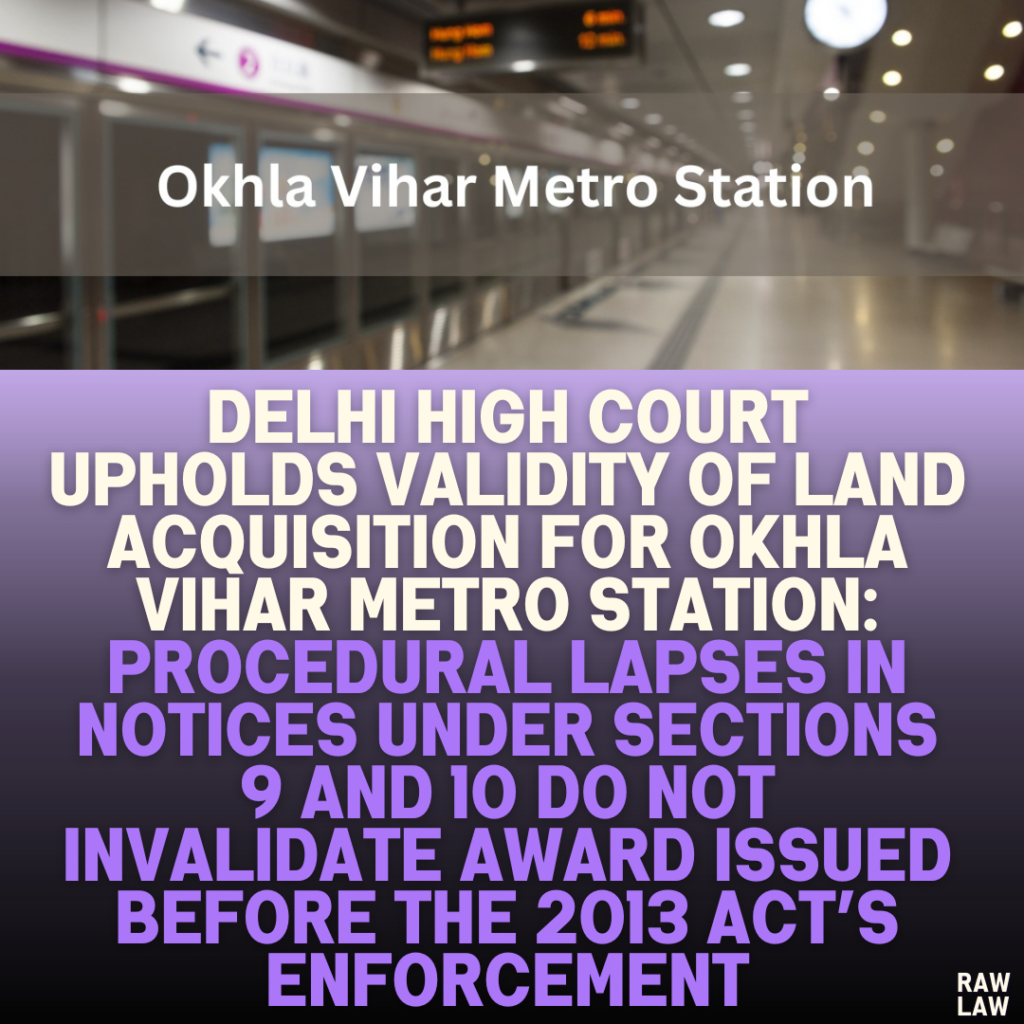1. Court’s Decision
The Delhi High Court dismissed petitions challenging an award issued under the Land Acquisition Act, 1894, affirming the acquisition of 2971.533 square meters of land in Bahapur, Okhla, New Delhi, for the construction of the Okhla Vihar Phase II Metro Station. The court held that:
- The award was validly issued on December 30, 2013.
- Procedural lapses in notices under Sections 9 and 10 did not invalidate the award or acquisition.
- The provisions of the Right to Fair Compensation and Transparency in Land Acquisition, Rehabilitation, and Resettlement Act, 2013 (“the 2013 Act”) were inapplicable.
2. Facts
- The land acquisition was initiated for a public purpose—the construction of a metro station.
- Notifications under Sections 4 and 6 of the Land Acquisition Act, 1894, were issued in August and September 2013, respectively.
- The award under Section 11 was signed on December 30, 2013, just before the 2013 Act came into force on January 1, 2014.
- Petitioners alleged procedural violations, including non-communication of notices under Sections 9 and 10, and argued for compensation under the 2013 Act.
3. Issues
- Was the award validly issued on December 30, 2013?
- Did alleged procedural lapses in notices under Sections 9 and 10 affect the validity of the acquisition?
- Could the provisions of the 2013 Act apply to determine compensation?
4. Petitioner’s Arguments
- Non-communication of Notices: Petitioners claimed that notices under Sections 9 and 10 were not served or were incomplete, depriving them of their right to participate in compensation determination.
- Invalid Award: They argued the award was antedated and not genuinely issued on December 30, 2013.
- Applicability of the 2013 Act: Petitioners sought compensation under the 2013 Act, contending that the award had not been properly communicated before its commencement.
- Violation of Status Quo: Petitioners claimed the acquisition was in violation of the interim status quo order of December 20, 2013.
5. Respondent’s Arguments
- Compliance with Notices: Notices under Sections 9 and 10 were served on December 3, 2013, and published onsite. Any procedural lapses were non-fatal and did not vitiate the acquisition.
- Award Validity: The award was signed and validly issued on December 30, 2013.
- Public Purpose: The acquisition was for the metro station, a project serving public interest.
- Procedural Irregularities: Minor errors in the notices did not prejudice the petitioners or affect the validity of the award.
6. Analysis of the Law
- Section 9 Compliance: The court referred to May George v. Special Tehsildar, where procedural lapses in notices were deemed non-fatal. It held that notices under Section 9 are directory, not mandatory, and any lapses did not prejudice the petitioner since they were aware of the acquisition.
- Award Date Validity: The court relied on Kaliyappan v. State of Kerala, holding that the award is valid from the date it is signed by the Collector. Delayed communication does not invalidate it.
- Applicability of the 2013 Act: Section 24 of the 2013 Act applies only if no award has been made under the 1894 Act. The court emphasized that the award issued on December 30, 2013, precluded the applicability of the 2013 Act.
7. Precedent Analysis
- Premji Nathu v. State of Gujarat: Distinguished as it dealt with the limitation for seeking enhanced compensation under Section 18 of the Act, not the validity of the award.
- Faizabad-Ayodhya Development Authority v. Dr. Rajesh Kumar Pandey: Clarified that if awards are delayed due to interim court orders, the 2013 Act does not automatically apply.
8. Court’s Reasoning
- The petitioner was aware of the acquisition and participated in surveys, negating claims of lack of notice.
- Procedural lapses in serving notices did not affect the validity of the award, as the petitioners acknowledged the acquisition and negotiated possession transfer.
- The award, signed on December 30, 2013, complied with the requirements of the 1894 Act.
- The 2013 Act did not apply because the award was made before its commencement.
- The interim status quo order of December 20, 2013, did not preclude the award issuance, as it pertained to limited reliefs sought by the petitioner.
9. Conclusion
The court dismissed the petitions, affirming:
- The validity of the award under the 1894 Act.
- That compensation claims must proceed as per the provisions of the 1894 Act.
10. Implications
This judgment reinforces that:
- Procedural lapses in notices do not invalidate acquisitions for public purposes.
- Awards under the 1894 Act, issued before January 1, 2014, are not affected by the 2013 Act.
- Public purpose projects, like metro construction, take precedence, provided statutory requirements are broadly complied with.



